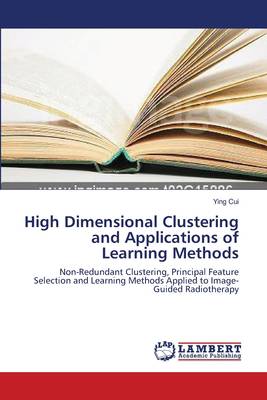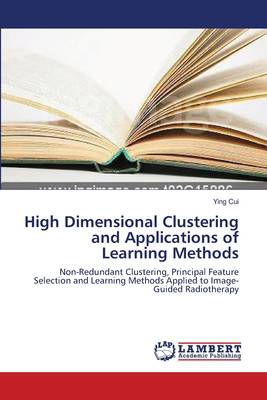
- Afhalen na 1 uur in een winkel met voorraad
- Gratis thuislevering in België vanaf € 30
- Ruim aanbod met 7 miljoen producten
- Afhalen na 1 uur in een winkel met voorraad
- Gratis thuislevering in België vanaf € 30
- Ruim aanbod met 7 miljoen producten
Zoeken
High Dimensional Clustering and Applications of Learning Methods
Non-Redundant Clustering, Principal Feature Selection and Learning Methods Applied to Image- Guided Radiotherapy
Ying Cui
Paperback | Engels
€ 71,45
+ 142 punten
Omschrijving
This book is divided into two parts. The first part
is about non-redundant clustering and feature
selection for high dimensional data. The second
part is on applying learning techniques to lung
tumor image-guided radiotherapy. In the first part,
a new clustering paradigm is investigated for
exploratory data analysis: find all non-redundant
clustering views of the data. Also a feature
selection method is developed based on the popular
transformation approach: principal component
analysis (PCA). In the second part, machine
learning algorithms are designed to aid lung tumor
image-guided radiotherapy (IGRT). Specifically,
intensive studies are preformed for gating and for
directly tracking the tumor. For gating, two
methods are developed: (1) an ensemble of templates
where the representative templates are selected by
Gaussian mixture clustering, and (2) a support
vector machine (SVM) classifier with radial basis
kernels. For the tracking problem, a multiple-
template matching method is explored to capture the
varying tumor appearance throughout the different
phases of the breathing cycle.
is about non-redundant clustering and feature
selection for high dimensional data. The second
part is on applying learning techniques to lung
tumor image-guided radiotherapy. In the first part,
a new clustering paradigm is investigated for
exploratory data analysis: find all non-redundant
clustering views of the data. Also a feature
selection method is developed based on the popular
transformation approach: principal component
analysis (PCA). In the second part, machine
learning algorithms are designed to aid lung tumor
image-guided radiotherapy (IGRT). Specifically,
intensive studies are preformed for gating and for
directly tracking the tumor. For gating, two
methods are developed: (1) an ensemble of templates
where the representative templates are selected by
Gaussian mixture clustering, and (2) a support
vector machine (SVM) classifier with radial basis
kernels. For the tracking problem, a multiple-
template matching method is explored to capture the
varying tumor appearance throughout the different
phases of the breathing cycle.
Specificaties
Betrokkenen
- Auteur(s):
- Uitgeverij:
Inhoud
- Aantal bladzijden:
- 160
- Taal:
- Engels
Eigenschappen
- Productcode (EAN):
- 9783838300801
- Verschijningsdatum:
- 23/04/2009
- Uitvoering:
- Paperback
- Afmetingen:
- 152 mm x 220 mm
- Gewicht:
- 245 g

Alleen bij Standaard Boekhandel
+ 142 punten op je klantenkaart van Standaard Boekhandel
Beoordelingen
We publiceren alleen reviews die voldoen aan de voorwaarden voor reviews. Bekijk onze voorwaarden voor reviews.







